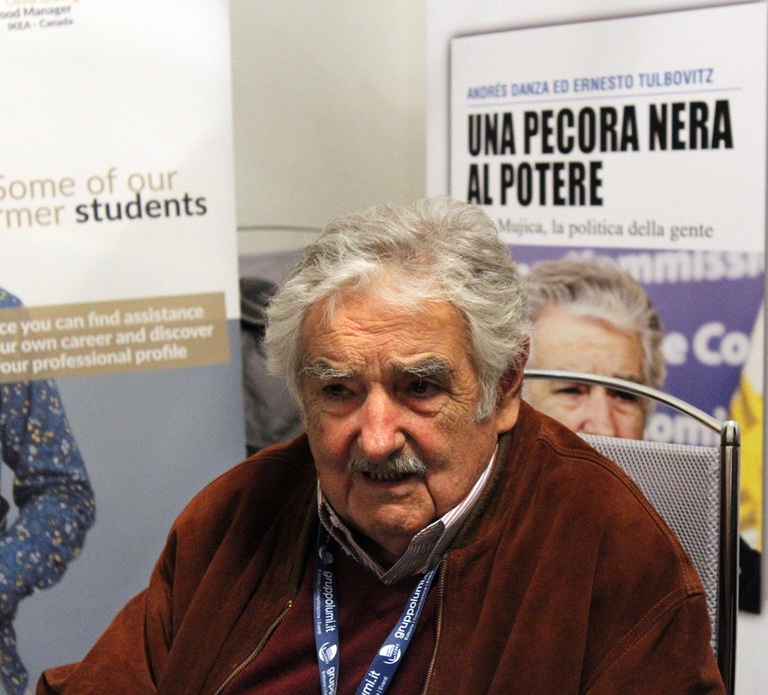
Homecast is a podcast series recorded in quarantine in which creatives from around the world share their lived experiences of these unique circumstances. Creator Giacomo De Poli tells us why this collective diary was needed now more than ever.
José Pepe Mujica, ex presidente dell’Uruguay, è in Italia per presentare il suo ultimo libro Una pecora nera al potere, la politica della gente. Nella tappa milanese ha dialogato con Petrini e Sepúlveda, sulla felicità.
Three major exponents and representatives of the modern culture have come together to talk about happiness, and revealed how to pursue it – by eliminating the hurdles we find on our path. Slow Food founder Carlin Petrini, Chilean writer Luis Sepúlveda and José “Pepe” Mujica, senator and president of Uruguay from 2010 to 2015, have exposed their ideas on how to stop the haemorrhage of values characterising our society to a young audience at the Università degli Studi of Milan on the 6th of November.
The event was the presentation of Mujica’s biography A Black Sheep to Power, which collects anecdotes, stories and talks of Uruguay’s former president, before and during his term. It’s a multifaceted depiction that has also emerged – unfiltered – from the talk Mujica had with Petrini and Sepúlveda about issues like inequality and the importance of politics and development. “We must think as a species and fight to save the Earth, without forgetting to cultivate progress with intelligence,” said Mujica.
“My generation was convinced that things would steadily get better with the passing of time. But that was naïve,” Mujica said beginning his speech. “The culture of immanence, which is the totality of our subliminal actions, drives our choices in life. The current economic system creates in us necessities we don’t really need. The so called consumer society is aimed at making money. We feel the need of buying and we embrace this as a religion. We must change the way we think. If economic development doesn’t also bring us happiness, then it’s a false development”.
Sepúlveda as well has talked about the need of reconsider our purchasing habits in terms of the time we have spent for them, rather than money. “The final and natural destiny of our species is removing all obstacles to happiness”. He thus cited Salvador Allende who said in an interview in 1971 – when he was Chile’s President – that “revolution isn’t made to live longer, but to live happier”.
Una pecora nera al potere. La presentazione del libro dell’ex presidente dell’Uruguay Pepe Mujica all’Università di Milano. pic.twitter.com/GksgZBHCRr
— LifeGate (@lifegate) 6 novembre 2016
“I’m part of the only generation in recent history to have lived 70 years of peace. I should thus be the happiest person in Italy,” said Petrini. Yet, the youth of today can hardly strive for happiness despite they live in a time in which peace flourishes and resources are wasted. So, having more people like Mujica governing the world is vital. “He, beyond politics, has managed to communicate trust to the youth through one thing: good example”.
“If all people are equal,” as provided by all democracies, “politicians are not an exception. They should live like the majority of the population, not like an élite,” ended Mujica. If they’re most interested in power or money, they “should go work for multinationals and quit politics”. Dignity and honesty are priceless basic values, and if you’re lucky enough to be chosen to be the representative of a community, you should just be “honoured and happy”. A destiny politicians should pay for, or at least be grateful. It should be a real reason of happiness, which is not about pleasure but balance and the will of fighting to save the Earth, the only thing that we all have in common.
Siamo anche su WhatsApp. Segui il canale ufficiale LifeGate per restare aggiornata, aggiornato sulle ultime notizie e sulle nostre attività.
![]()
Quest'opera è distribuita con Licenza Creative Commons Attribuzione - Non commerciale - Non opere derivate 4.0 Internazionale.
Homecast is a podcast series recorded in quarantine in which creatives from around the world share their lived experiences of these unique circumstances. Creator Giacomo De Poli tells us why this collective diary was needed now more than ever.
Time magazine’s 100 Women of the Year project sheds light on influential women’s stories, from Amelia Earhart to Greta Thunberg. A selection of some of the greats for International Women’s Day.
Leaving cliches behind, beauty and sexuality in old age are widely unexplored topics. Photographer Arianne Clément tells why she chose to shed light on this universe.
Un violador en tu camino – the rapist is you – is an anthem protesting the impunity of gender-based violence. It began in Chile and has become a global flash mob, bringing people to the streets and resonating all over the world.
The Oxford English Dictionary has chosen “climate emergency” as 2019’s Word of the Year because of its effectiveness in communicating a sense of urgency in the fight against global warming.
Filmmaker Dhondup Wangchen was imprisoned by the Chinese government for his documentary condemning the Tibetan condition. He tells us how he continues to fight for his people even after the traumas faced.
To mark the release of Anthropocene: The Human Epoch, we interviewed photographer and co-director Edward Burtynsky, who told us the story behind the documentary.
Snowflakes can be deceiving. Banksy transformed them from a marker of winter festivities into a symbol of the plague of air pollution in his mural Season’s greetings in Port Talbot, Wales.
Artist Jeff Hong imagined how Disney fairy tales’ characters would live in the real world: the result – or better the ending – is everything but happy.








